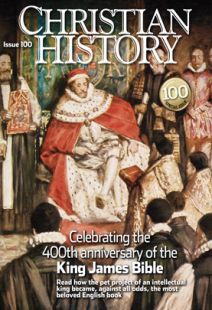Hail to the chief’s Bible
IN 1911, on the 300th anniversary of the KJV’s first printing, former president Theodore Roosevelt proclaimed, “No other book of any kind ever written in English—perhaps no other book ever written in any other tongue—has ever so affected the whole life of a people as this authorized version of the Scriptures has affected the life of the English-speaking peoples.” Roosevelt also quoted “the great scientist Huxley,” who had called the KJV “the Magna Charta of the poor and the oppressed . . . the most democratic book in the world.”
Presidential appreciation for the KJV has continued into the 20th and, to a lesser extent, the 21st century. On January 20, 1961, John F. Kennedy quoted the KJV twice in his presidential inaugural address: first from Isaiah 58:6 with reference to the Communist world (“Let both sides unite to heed in all corners of the earth the command of Isaiah—to ‘undo the heavy burdens . . . [and] let the oppressed go free’”) and then from Romans 12:12 in urging his hearers to respond to “the trumpet” that summons citizens “to bear the burden of a long twilight struggle year in and year out, ‘rejoicing in hope, patient in tribulation.’ ”
Four years later Lyndon Baines Johnson ended his inaugural address by quoting the KJV from II Chronicles 1:10 (“For myself, I ask only in the words of an ancient leader: ‘Give me now wisdom and knowledge that I may go out and come in before this people: for who can judge this, thy people, that is so great?’”)
In his inaugural, Richard Nixon quoted Malachi 4:2 from the Revised Standard modernization of the KJV (“The peace we seek . . . is not victory over any other people, but the peace that comes ‘with healing in its wings’”). Both Nixon and Johnson took the presidential oath of office with their hands placed on a KJV Bible opened to Isaiah 2:4 (“And He shall judge among the nations, and shall rebuke many people: and they shall beat their swords into plowshares and their spears into pruning-hooks; nation shall not lift up sword against nation, neither shall they learn war any more”).
Then-governor Bill Clinton, in his acceptance speech as the Democratic candidate for president on July 16, 1992, twice quoted passages from the Bible, including one directly from the KJV (Prov. 29:18—“Where there is no vision, the people perish”). He also used at least three other phrases from the KJV at strategic moments in his address (“eyes of the Lord,” from Gen. 6:8; “keep the faith” from Rev. 14:12; and “new covenant” from Jer. 31:31). George W. Bush, in his first inaugural address, quoted a letter to President Jefferson saying, “We know the race is not to the swift nor the battle to the strong. Do you not think an angel rides in the whirlwind and directs this storm?”—a combination of KJV texts from Ecclesiastes 9 and 12.
By Mark Noll
[Christian History originally published this article in Christian History Issue #100 in 2011]
Next articles
King James Version: Recommended Resources
If this issue has piqued your interest in the KJV, here are some further windows into the history, language, and legacy of this translation
The EditorsEditor’s note: People of faith in America
American christianity is, at the very least, odd
Jennifer Woodruff TaitSupport us
Christian History Institute (CHI) is a non-profit Pennsylvania corporation founded in 1982. Your donations support the continuation of this ministry
Donate



